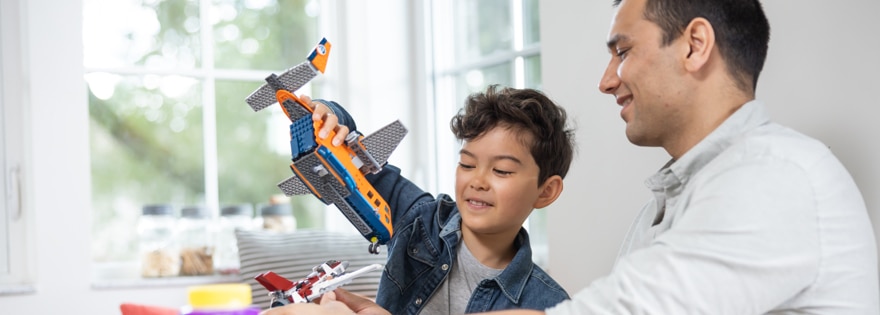

Your child is busy growing, and learning and you’re busy trying to give them everything they need to stay healthy while doing it. We’ve outlined a few of the best ways you can make sure your child is set up for optimal brain and immune health.
Good health begins at home
School, friends, and extracurriculars all have an impact on your child’s wellbeing, but at the end of the day, teaching and encouraging good health begins at home. From breakfast to bedtime, modeling habits that maintain your immune system and health will motivate your child to do them on their own.
Whatever you expect of your child, do yourself. When you ask them to wash their hands, wash yours as well. When it’s time for their daily multivitamin, take one for yourself. Immune-safe practices will not only start to become habits, but they’ll be moments of connection and bonding for you and your child.
Prioritize Nutrition
A balanced and healthy diet is one of the most important things you can do for your child’s immune and brain health. Eating a diet that includes a variety of fruits and vegetables can help provide the immune system with the vitamins and nutrients that it needs to function properly.
In the same way, cognitive health is also dependent on the quality of your diet. This is largely due to what is called the gut-brain connection, that is, the closely connected relationship between the stomach and the brain. The brain has a direct effect on the stomach and intestines (that’s why the thought of something can “make you feel sick”). Likewise, what you eat can have a direct impact on cognitive health and emotional wellbeing.1
Let’s take a look at a few kid-friendly, brain-supporting foods:
Green, leafy vegetables
Leafy vegetables such as kale, spinach, or broccoli are rich in nutrients such as vitamin K, folate, and beta-carotene.2
Kid-friendly hack: Blend spinach and kale in a tasty fruit smoothie, or serve broccoli with a yummy hummus dip.
Fatty fish
Fatty fish such as salmon are great sources of brain-healthy omega-3 fatty acids.3
Kid-friendly hack: Try your hand at crispy salmon nuggets or fun fish tacos. Or, make getting your omega-3s fun and easy with fish-shaped Sisu Omega-3 Bursts.
Walnuts
Nuts are excellent sources of proteins and fats, and walnuts, in particular, have been connected to positive cognitive health.4
Kid-friendly hack: Trail Mix with a variety of nuts and seeds is the perfect afternoon snack. Add dark chocolate chips for a sweet treat.
Use kid-friendly vitamins such as Sisu U-Cubes Multi, U-Cubes Vitamin C, or Teens Multi to fill in the gaps.
Stick to a routine
Though maintaining a consistent schedule is challenging for many parents, it may be just what your child needs. Research has found that children who grow up with predictable, daily routines are less likely to have time-management or attention problems as adults, and are more likely to feel a sense of family stability.5 Adhering to a predictable routine can help give your child a sense of security, minimize their day-to-day stress, and focus on succeeding in school, or other areas of life.
Similarly, another study that looked specifically at bedtime routines discovered that children in families with optimal bedtime routines showed better performance in terms of cognitive function – specifically working memory, inhibition and attention, and cognitive flexibility.6
Taking Sisu Ester-C® 250 mg Chewable at the same time each day is a great way to create a healthy routine while promoting good immune health.
Exercise
After sitting in a classroom or at the kitchen table for hours, it’s important for children to move their bodies and release their energy. Not only will this release of energy make the evenings more relaxing for you as a parent, but it will release positive endorphins that contribute to a better mood and less stress. Research has also found that participating in sports in childhood positively influences cognitive and emotional functions.7
Sleep
Sleep is an important part of everyone’s routine and is an indispensable part of a healthy lifestyle, especially for growing children. Getting adequate sleep can not only support a healthy immune system, but it can help improve your child’s cognitive development.
Studies have shown that adequate sleep supports memory and memory consolidation in children and teens whose brains are rapidly developing and reorganizing.8 Experts recommend 9-11 hours of sleep per night for children 5-13 years old, and 8-10 hours of sleep for children 14-17.9
You can help make sure your child is getting enough sleep by:
- Creating and sticking to a consistent bedtime routine.
- Turning off all electronics and screens at least one hour before bedtime.
- Relax before bedtime with reading or quiet play.
Music
If you’re like most parents, you’ve probably turned on your child’s favourite song as a way of calming them down or improving their mood. From an early age, many children recognize and respond positively to music. Research has repeatedly shown that music has positive effects on the development of children.10 It has also demonstrated that music training in children results in long-term enhancement of visual-spatial, verbal, and mathematical skills.11
Stress-free environment
As an adult, stress is a common and even expected part of life. What you may not realize, however, is that your child may also deal with stress on a regular basis as they navigate friendships, school, and new challenges.
Chronic stress can affect neurological changes that can make children wary and have difficulty controlling their emotions, focusing on tasks, and forming healthy relationships. Thanks to the plasticity of the brain, the neurobiological response to stress can be buffered and even reversed. Warm, nurturing relationships between children and adults can help reduce stress in children.12
Here are a few ways you can help facilitate a stress-free environment at home:
- Encourage free playtime: Foster creativity and fun by ensuring your child has unregimented playtime.
- Be a good role model: You are the first one your child will look to as a model for how to handle stressful situations. Teach your child positive stress-management skills by modeling them yourself first.
- Teach your child to share their feelings: Help your child process their emotions by teaching them to verbalize how they feel.
 Summing it up
Summing it up
At the end of the day, helping to support your kids’ immune and brain health is all about establishing simple, healthy habits that can be repeated every day. Setting a good example and being a role model for your child in every aspect of health will encourage them to prioritize their health and happiness as they grow.
To find a store near you with the mentioned Sisu products, click here.
Always read and follow the product label. Products may not be suitable for everyone.
1 https://www.health.harvard.edu/diseases-and-conditions/the-gut-brain-connection
2 https://www.health.harvard.edu/mind-and-mood/foods-linked-to-better-brainpower
3 https://www.ncbi.nlm.nih.gov/pmc/articles/PMC2805706/
4 https://www.ncbi.nlm.nih.gov/pmc/articles/PMC2805706/
5 https://www.sciencedirect.com/science/article/abs/pii/S0193397316301241
6 https://www.ncbi.nlm.nih.gov/pmc/articles/PMC5861615/
7 https://www.ncbi.nlm.nih.gov/pmc/articles/PMC5923842/
8 https://citeseerx.ist.psu.edu/viewdoc/download?doi=10.1.1.1063.1398&rep=rep1&type=pdf
9 https://www.canada.ca/en/public-health/services/publications/healthy-living/canadian-children-getting-enough-sleep-infographic.html
10 https://www.ncbi.nlm.nih.gov/pmc/articles/PMC5626863/
11 https://www.researchgate.net/publication/7181553_Effects_of_Music_Training_on_The_Child’s_Brain_and_Cognitive_Development
12 https://www.researchgate.net/publication/269771722_Stress_and_Child_Development

